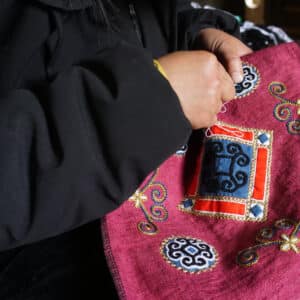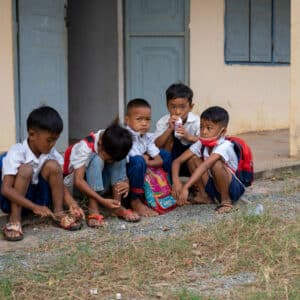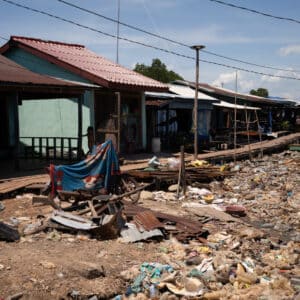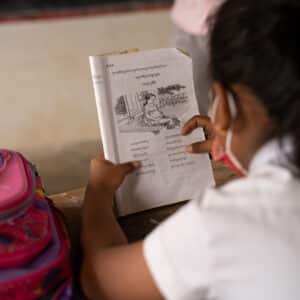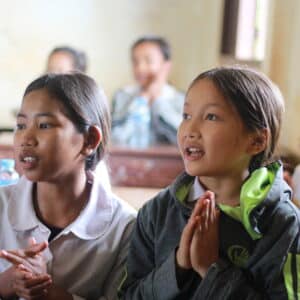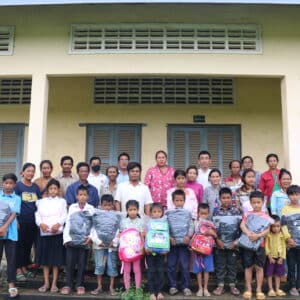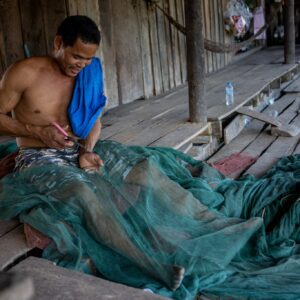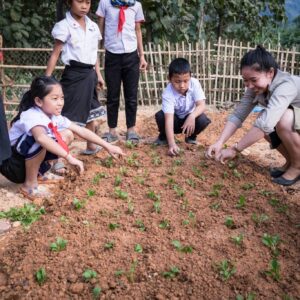« It is difficult even for a man from an ethnic minority group to start a business, not to mention a woman like me but nothing can stop me from following my dream.”
In the small scenic rural town of Sapa, tucked high in the mountains Vietnam’s northern Lao Cai province, 27-year-old entrepreneur Lo Thi Hanh is shattering gender stereotypes that typically see rural women, especially those from ethnic minority groups, fulfil unpaid domestic roles.
Like many girls from her village, Hanh dropped out of school as a teenager get married and start a family. But, once her son started attending school, Hanh began to imagine a life for herself outside the home and set about making her dream of promoting Tay culture a reality through offering guided tours and homestays in her village as well as promoting handicrafts.

Hanh’s mother and grandmother never had the opportunity to receive and education and for them as well as other women in the community, Hanh wanted to create better economic opportunities and connect her village to markets to generate tourism and income for locals.
Tay people make up the second-largest ethnic group in Vietnam and traditionally wear indigo-blue clothes. In the past, the Tay were famous for their indigo dyeing techniques and Tay women were known for their ability to weave colorful threads on indigo fabric to make unique brocade cloths.

When the Covid-19 pandemic hit and closed Hanh’s homestay business, she began to focus more on bringing indigo fabric to a new market and breathing new life into old traditions by selling the dyed fabrics on social media such as Facebook and Instagram. “It is difficult even for a man from an ethnic minority group to start a business, not to mention a woman like me,” say says. “But nothing can stop me from following my dream.” In September 2019, Hanh founded the Muong Bo Xanh Cooperative and joined Aide et Action’s livelihoods project in February 2020 to learn new business skills and receive training and mentorship.
With support from HSBC, our incubator project in Lao Cai and Hoa Binh provinces, is designed to support ethnic minority entrepreneurs like Hanh to set up their own businesses. The incubator is encouraging young entrepreneurs to explore new options and opportunities other than traditional career paths so they may realise their entrepreneurship aspirations, as well as to inject new impetus to economic development.
Currently, Hanh has 20 members in the Cooperative and as well as creating and selling Indigo products such as bags, curtains, cushion covers, clothes and more, they are also growing and selling vegetables and crops.
In addition to supporting women like Hanh with start-up businesses, our livelihood work in Vietnam is also reviewing and revising career orientation materials for upper-secondary schools to ensure ethnic minority youth have relevant career guidance and vocational training to match their skills to the current labour market.
In partnership with the European Union, Aide et Action is currently collaborating with North West Development Center, a local NGO based in Hoa Binh, to initiate these reforms. The work, which began in 2020 and will wrap up in 2023, is set to reach 7,165 ethnic minority youth, including 5,088 high school students, 1,441 college students and 636 youth not currently enrolled in formal education.
We believe our varied education approach will play a key role in supporting the transition of ethnic minorities into household enterprise and wage employment – ultimately feeding into Vitenam’s long-term prosperity.
According to the McKinsey Global Institute, advancing economic opportunities and equality for women in the Asia-pacific region could increase the region’s collective annual Gross Domestic Product by 12%, or $4.5 trillion, by 2025.
While the Covid-19 pandemic has created economic setbacks, Hanh remains committed to her dream. “I wish to expand my business,” she says, adding that she can never learn enough marketing skills. “The more people that know about us, the more I can help more women in my community.”




